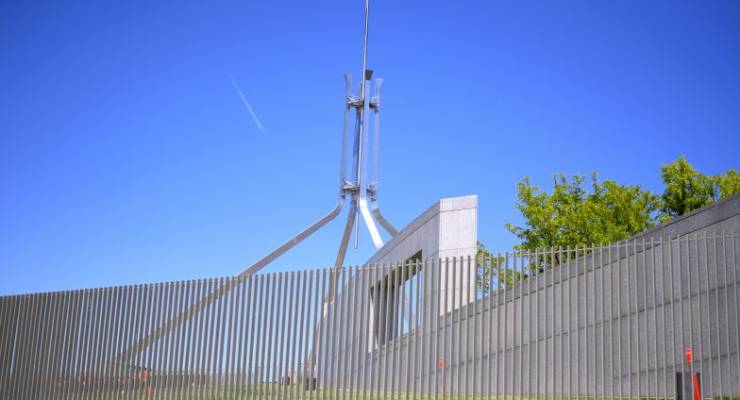
Of all the excuses I’ve heard for withholding public information, my latest run-in with parliamentary authorities wins the prize for the most creative.
For more than eight months I’ve been trying to get hold of a list of organisations holding lobbyist security passes to Parliament House in Canberra. I’m not even asking for the names of individual pass holders, just a list of the organisations holding “sponsored” passes and how many each of them has.
Releasing the information should be a no-brainer. Knowing who has unrestricted access to politicians in Canberra — as well as extensive use of parliament’s publicly funded facilities, let’s not forget — is fundamental to a healthy democracy. That’s why lists of passholders have long been routinely published in other countries including the US, the UK and New Zealand.
It is hard to make a sensible argument why this information should remain hidden from public scrutiny. What possible excuse, then, could parliamentary authorities come up with for rejecting my request?
This one: contempt of parliament. The Parliamentary Privileges Act 1987 defines it as “improper interference with the free exercise by a House or committee of its authority or functions, or with the free performance by a member of the member’s duties as a member”.
It is a serious offence, punishable by a hefty fine and a jail sentence of up to six months. Bracing myself, I went back to ask what the hell contempt of parliament has got to do with security passes for lobbyists.
“The release of the list of companies holding sponsored passes could affect the flow of information to members of parliament, and obstruct senators and members in the performance of their functions,” DPS officials said. Translated: lobbyists will only lobby in secret, and politicians can’t do their job without being lobbied.
Not only that, but now I was told it would “create a potential security threat” too. Holy crap. I had only wanted to find out how many people from BHP and Medicare were walking through the hallways of Parliament House and now it seems I’m on the verge of annihilating Australian democracy!
The reasons given for refusing to publish the information are, of course, certifiable nonsense. Unfortunately though, because DPS is not subject to Freedom of Information rules, it can’t be formally challenged.
I’m not the first to question parliament’s secrecy around lobby pass holders, nor the first to be frustrated by it. Former senator Jacqui Lambie made an issue of it last year, shortly before she was discovered to be as British as Big Ben and booted from the Senate. Outgoing Greens senator Lee Rhiannon also raised it at Senate Estimates in October, where she too was told the list would remain secret for security reasons.
“If you get someone who wanted to identify themselves as a passholder, they could create a likeness to a passholder, steal the pass, do harm to the person of the pass they’ve stolen and then enter this building,” said former senate president Stephen Parry, presumably following an evening binge-watching Homeland.
Ignoring for a minute the fact that other countries manage this risk just fine, the logical conclusion of Parry’s argument is that the names of MPs and senators should be kept secret as well, lest somebody mug Barnaby Joyce outside parliament, put on an Akubra hat and negotiate themselves a handsome TV deal in his name.
Regardless, in my case, I specifically excluded individual names to preclude this being used as a reason to withhold the information. Somehow they managed it anyway.
Most would agree, I think, that lobbying is a legitimate democratic activity. It can often (though not always) contribute much-needed expertise to the policy-making process, helping to rectify bad legislation and give a collective voice to those who struggle to be heard on their own. I have worked for non-profit organisations that regularly lobby as part of their work, and even lobbied politicians myself on occasion.
To retain its legitimacy, however, lobbying must be transparent and open to public scrutiny. Keeping this list hidden from public view maintains a damaging trust gap between politicians, lobbyists and voters. There is no good reason for it to be secret, however hard Parliament tries to think of one.
So when parliamentary authorities tell me releasing a list of lobbyists with security passes would be damaging to democracy, I say the opposite is true. Until we are allowed to know who has special access to our politicians, our democracy will remain deeply flawed.








Great work William. Keep pushing.
I fully agree this is absolutely ridiculous, and transparency required. I look forward to further articles on this.
Also, another topic with transparency issues I hope you could cover is Political party donations (Federal and State)…….if parties can’t be trusted then all donations should go into the one bucket and split 50:50 at election time!! Any money spent not from this bucket would have to be accounted for. Simple really.
Similar to my proposal that we cannot trust parties to honestly declare donations so the obvious check should be the expenditure.
Then require, as per criminal law, a credible explanation of the source.
I’ve thought the same thing Matt from the hills, re donations. If companies are going to donate they should donate to a central fund, administered by an authority answerable to parliament, and funds handed out using the same formula as for elections, or based on seats in both houses. Funds from party nosh-ups for ‘ministerial availability’ should also be poured into the central fund. All donations recorded virtually real time, from whom, how much, and no foreign donations or multi-nationals need apply.
Thanks Matt. I agree donations are another interesting area to look into though I have a long list of other things first!
I hold a pass and work on behalf of my organisation to raise issues and provide information to parliamentarians, or more often their staff. I have no problem at all with the list being released or for people to know I engage in this manner. It is true that parliamentarians when contemplating various courses of action need to rely on input form all the sectors being impacted. They cannot rely solely on their departmental staff who have their own biases and are often underresourced to be able to provide full consultative advice to outline to them the potential consequences of the action they contemplate. The most we can hope to achieve through this process is to have our voice heard and weighed amongst the other considerations and other stakeholders. There is nothing inappropriate about that. Often we are raising issues that impact consumers of our products, taxpayers and voters, as much as they impact our own organisations. No fear here.
Thanks Guru. I have spoken to other sponsored passholders who don’t give a hoot about being on a public list, in fact they would expect it. I suspect the vast majority of organisations with passes would be quite happy for us to know they have access to politicians. I would worry about any that object.
The refusal to provide information on these public spirited “ companies holding sponsored passes” suggests that it could be interesting to know the reasons for “the flow of information to members of parliament” for external sources.
How this would “… obstruct senators and members in the performance of their functions” raises the question of their true functions such as “whom do they serve?”.
That’s just spectacularly tragic William. Good luck in your endeavours.
Thanks. Hopefully more politicians will make this an issue and get parliamentary authorities to see sense.
Security trumps Democracy! The terrorists have succeeded and SOME of our politicians (and lobbyists) are delighted.